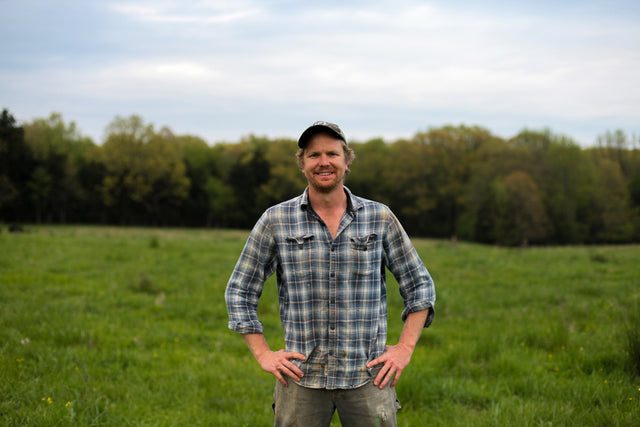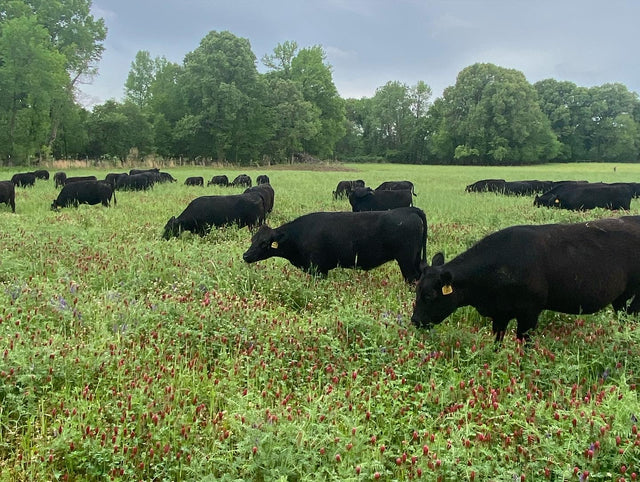mRNA Vaccines
We have been emailed and called several times by concerned customers over the past couple of weeks about the use of mRNA vaccines in our livestock. We wanted to make a quick statement regarding this issue.
Home Place Pastures does not use mRNA vaccines in any stage of production for any species of its livestock. We can comfortably commit to never using these vaccines in the future. Our program is rooted in providing livestock with what they need to be healthy and productive in a holistic, nature-based system (diverse, multispecies systems on pasture), as opposed to using modern tools to change the animal to suit the needs of a highly centralized, concentrated, and efficient single product production system (feedlots, hog barns, chicken houses). That said, we do use an “8-way” bacterin toxoid vaccine once for cattle at weaning, as do most of our producers, to protect against clostridial diseases (red water, black leg, others). This is not a viral vaccine, and is used one time about 18 months before harvest, while the approved withdrawal period for slaughter is just 3 weeks. We use a similar vaccine in hogs at weaning, one time, many months before the animal is harvested, to protect against circovirus and respiratory diseases. These vaccines have been considered best practice for farmers for years and decades in some cases, and there is ample data and research to support their use.
We do feel compelled to explain that there seems to be a lot of misinformation floating around about the use of mRNA vaccines in livestock production. There are no mRNA vaccines approved for use or in use for *{livestock production of any species in the U.S}. While I am tempted to use this as a chance to rally consumer support to our products, the simple fact remains that this is not currently something our customers should be worried about, as it doesn’t exist. Even if these were available, we would not have any reason to use them.
*this statement has been edited on April 21st because it is incorrect: It should read: {beef production in the U.S. There are mRNA vaccines approved for treating viral infections in swine (African Swine Fever, for one), but HPP and other regenerative, outdoor producers have no need to use these}.
That said, we would like to present our top concerns over meat production in the U.S., and what we feel you as the consumer should worry about when choosing how to feed your family.
1) Sub therapeutic antibiotic use (one of the tools of modern medicine mentioned above). Of all industrial meat production practices, this one is perhaps the least understood but the most alarming. Whether its poultry, swine, or cattle, the aggregation of thousands of animals from different places into tight, confined quarters for efficient finishing, creates a perfect condition for disease and sickness to spread. For these hyper concentrated, efficiency based systems to work without catastrophic death, loss and poor growth performance from disease pressure (feedlots, chicken houses, hog barns), producers must preemptively medicate their stock with a daily low dose of antibiotics, usually administered via feed or water. While this has “worked” to a large extent, the hidden and growing cost is becoming more and more evident in human health. We use the same antibiotics in human health as we do in livestock production. “Super-bugs”, or bacteria that form resistance to the constant low dose exposure found in these production systems, find their way to humans, and wreak havoc in the hospital setting. MRSA and affiliated untreatable infections are more and more prevalent, and what’s worse, the pipeline for developing new antibiotics is broken. HPP does not use antibiotics at any stage of production, ever. Here’s a quote from Pew Trust, a foundation that works to combat this issue:
*“Drug-resistant bacteria, or superbugs, present a serious and worsening threat to human health. A majority of doctors have encountered patients with infections that do not respond to available treatments, and when new drugs come to market, bacteria can quickly develop resistance. According to a report from the Centers for Disease Control and Prevention, Americans fight more than 2.8 million serious infections caused by antibiotic-resistant bacteria each year, and at least 35,000 die as a result.”
https://www.pewtrusts.org/en/research-and-analysis/articles/2016/12/tracking-the-pipeline-of-antibiotics-in-development#:~:text=The%20Pew%20Charitable%20Trusts%20has,from%20development%2C%20or%20remain%20stagnant.
2) “Product of the USA” label claim. Did you know that meat can bear this claim even if the animal was neither raised or harvested in the USA? Thanks to a country-of-origin label change policy enacted in 2016, imported beef that is reprocessed or repackaged in the U.S. can bear the “Product of the USA” label, even if it never set foot on U.S. soil. Consumer advocacy groups and domestic cattle producers have pushed to change this loophole, and force country of origin labels (COOL) on all beef products. The forced COOL stalled in congress due to threatened retaliatory tariffs from Canada and Mexico, but, under a proposed new rule, meat bearing the “Product of the USA” label must come from animals born, raised, and slaughtered in the USA. We feel strongly that consumers should not think product born, raised, and harvested overseas is a “Product of the USA”, and we are happy about this proposed rule change. This well help small domestic grass-fed producers (like HPP) compete, and help prevent the “greenwashing” of cheap imported product to mislead consumers. You can comment at the link below before June 11th to help make this policy a reality for domestic grass fed beef producers and the American consumer!
https://www.fsis.usda.gov/policy/federal-register-rulemaking/federal-register-rules/voluntarylabeling-fsis-regulated
3) Animal welfare concerns, environmental degradation, and rural economic decline. Aside from the pressing and pertinent issues above, these three things are overarching problems with our centralized food system that our farm directly combats. When you consider nothing but the price of your food (we fully understand that many are not in a financial position to consider anything else), you inadvertently support an industry that provides artificially cheap meat through scale, centralization, and efficiency, but does not reflect the growing cost of the above issues. We will elaborate on the complex issue of costs and pricing in a future post.
Home Place Pastures is a small, vertically integrated meat company, working hard in our rural community in the face of immense challenges to combat these issues. We raise, harvest, process, and distribute our products from our fifth generation farm just east of Como, MS, and have 25 employees working hard to provide you wholesome, nutrient dense food every day. We invite you to come visit us anytime. Your support directly contributes to a healthier food system and we are grateful for it!
Marshall
More stories

Moldly Closets, Lost Dogs, and Broken Limbs: A Memorable Day at HPP


